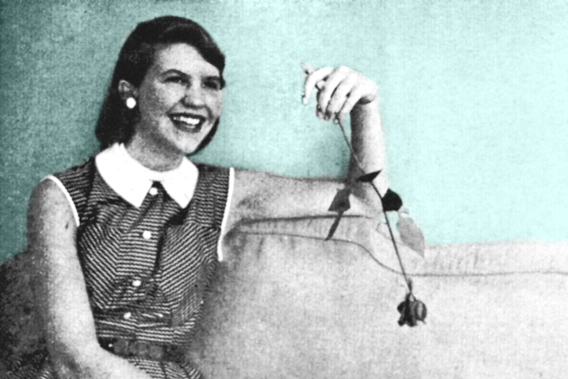
During final exam period at Cambridge, a young Sylvia Plath writes to her mother about the “religion” of style, literary criticism, and the stresses of sitting for exams.
Wednesday A.M.
May 29, 1957
Dearest Mother,
I am taking time early this sunny morning to limber up my stiff fingers in preparation for my Tragedy exam this afternoon and write you so you will know I’m still extant. Just. I have honestly never undergone such physical torture as writing furiously from 6 to 7 hours a day (for the last two days) with my unpracticed pen-hand. Every night I come home and lie in a hot tub, massaging it back to action. Ted says I’m a victim of evolution and have adapted to the higher stage of typing and am at a disadvantage when forced to compete on a lower stage of handwriting!
My exams Monday (another American girl and I went with knees shaking) were quite pleasant. French translation and notes, fair and simple, and the afternoon Essay topics varied and interesting—a marked change from papers of other years.
I took “Stylization,” and, I think, wrote a very clever essay ostensibly in praise of style in all its forms as a religious devotee of style, defining it as that order, line, form, and rhythm in everything from the sonnet to the whalebone corset which renders the unruly natural world into becoming bearable. I made up a fable of God as the Supreme Stylizer and the Fall, and an allegory of the history of man—a bloody pageant in search of the Ultimate Style of thought, ritual, etc., bringing in Yeats and Eliot, etc. … Anyway, I was elated Monday, but the exams yesterday were worse than anything I had imagined. Dating, that black terror of Americans who have no sense of the history of language, was compulsory, and it took half an hour simply to read the exam through. …
… for D. H. Lawrence I had read most of the novels and memorized passages on moral theory only to be forbidden to speak of his novels and requested to analyze his life development (a favorite word) from either his short stories or nonfiction and verse. I was so furious at this that I got back by writing on his fable, “The Man Who Died,” about Jesus, under the question on fable and moral … All the questions bore no reference to the moral work of the writers, but were large, general relations to politics, law, the “thought of the century,” etc. A mean, vague, fly-catching mind behind it all. As one person said to me on going out: “It took me an hour to find how I could fit what I knew into the questions.” Well, I wrote on Hobbes, Lawrence, Blake and Plato with references to my reading, which has certainly been wider than any of the other people’s. It’s disgusting to think that two years of work and excellent, articulate, thoughtful papers should be judged on the basis of these exams and nothing else. I have been so wound up by the enormity of disgorging such amounts of knowledge morning and afternoon that I am just going to spend my time on the moors (after the colossal job of packing this weekend), lying in the sun, hiking and unwinding. I’ll deserve it!
… I … got a note from the Yale Press, saying my book had been chosen among the finalists for the publication prize, but Auden wouldn’t have judged them till some time in early summer. My heart sank as I remember his judgments on my early Smith poems, but I do hope my book, “Two Lovers and a Beachcomber,” shows growth and would give anything to have it win; Auden would have to write a foreword to it then. …
x x x Sivvy
P.S. Wednesday, 6 p.m. Tragedy exam all over; very stimulating and fair to make up for yesterday’s two horrors. Only one to go Friday a.m.—blessed Chaucer and a whole day (!) to study for it. Luck and love to Warren.
x x x Siv.
FURTHER READING
Sylvia Plath talks more about her academic and poetic interests in a 1962 interview with Peter Orr, which can be found here.
Here is Plath’s reading of her poem “Daddy”—which, Katie Roiphe argues here, could actually be about her mother.
A chapter from Nelson Hilton’s Lexis Complexes giving further analysis of Sylvia and Aurelia Plath’s relationship can be found here.


